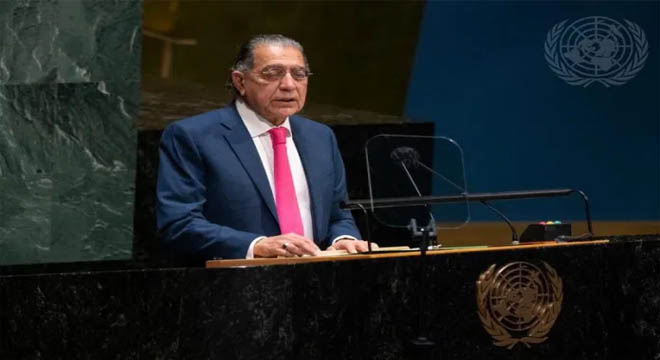UNITED NATIONS, : The President of UN Economic and Social Council (ECOSOC), Ambassador Munir Akram of Pakistan, Wednesday underscored the need for ensuring that the initially approved coronavirus vaccines are made available to everyone, everywhere, as the deadly virus had impacted the entire world.
“The vaccine must be seen as a global public good,” he told a virtual year-end press conference, while highlighting the plight of hard-hit poor and developing countries .
Noting the problems in equitable distribution, Ambassador Akram said an emergency response was needed to generate and mobilize the financing required to enable the countries foreign countries to have the fiscal space to recover from the impacts of the crisis.
“We need to generate additional liquidity for the developing countries,” he said, suggesting that this could be done through the creation of new Special Drawing Rights (SDRs).
Also, the ECOSOC president said, investing in the ACT-Accelerator, and its COVAX Facility, is the fastest way to end the pandemic and ensure a sustainable economic recovery.
The huge debt burden of developing countries must be addressed to avoid insolvency as well as providing them access to financing, especially concessional financing, to avoid a liquidity crisis and combatting illicit financial flows.
“Alleviating crushing debt is absolutely crucial,” Ambassador Akram said. adding that the UN welcomed the steps taken by the G20 (industrialized countries), including the suspension of debt service payments for the poorest countries, but this was not enough.
In this regard, Ambassador Akram said he proposed the establishment of a facility for infrastructure investment in developing countries, as a public-private partnership, to spur economic development as they cope with the huge coronavirus-inflicted losses.
Replying to a question, he said that the facility could mobilize and coordinate investment decisions and actions by developing countries, ODA (official development assistance) providers and private and public sector investors to advance the realization of the Sustainable Development Goals (SDGs).
To another question, Ambassador Akram said he was confident that Pakistan would deal with the second surge of coronavirus as well as it combated with the first one.
Pakistan, he said, was able to deal “fairly well” with the COVID-19 through smart lockdowns that reduced the impact on the entire economy and by injecting $8 billion aid package that included cash and in-kind support for the needy.
“This was done utilizing digital technology, ensured an efficient and equitable distribution that reduced the impact on the poorest,” he said. “But the economy has contracted, around five percent, and there seems to be sign of a robust recovery, exports are up, industry provided support, so job creation through construction and agricultural industries is robust.”
Asked about the difficulties Iran was facing as a result of the U.S sanctions, Ambassador Akram expressed the hope that a way to express international solidarity on this issue would be found to ensure that all people have access to medical facilities needed to save lives. “We hope that with the changing situation in the world, we will see a revival of international solidarity”.
Follow the PNI Facebook page for the latest news and updates.









